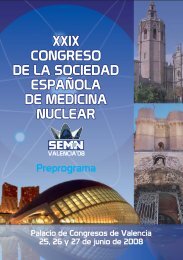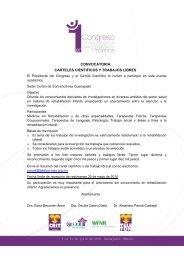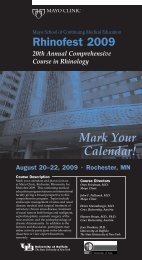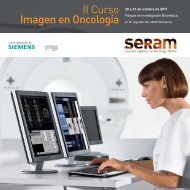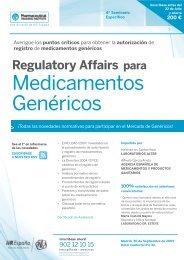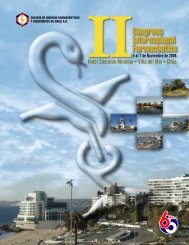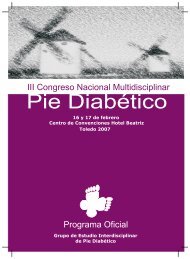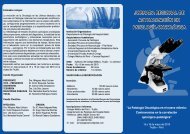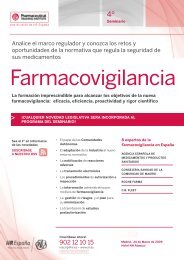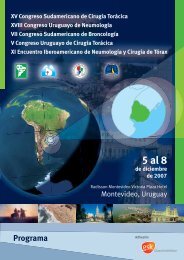- Page 1 and 2:
: imaging generations myESR.org Fin
- Page 3 and 4:
welcomes you to its annual meeting,
- Page 5 and 6:
© stefan liewehr As the first Aust
- Page 7 and 8:
Committees & Dignitaries Programme
- Page 9 and 10:
E-SAP (Self Assessment Programme) I
- Page 11:
Head and Neck Chairman: M.G. Mack;
- Page 14 and 15:
Dignitaries Special Presidential Aw
- Page 16 and 17:
Dignitaries Kaori Togashi Kyoto/JP
- Page 18 and 19:
Dignitaries Robert E. Steiner Londo
- Page 20 and 21:
Dignitaries Martine Rémy-Jardin Li
- Page 22 and 23:
Special Presidential Award Elias A.
- Page 24 and 25:
Welcome to ECR Arts & Culture! ESR
- Page 26 and 27:
Time Schedule 07:00 registration ro
- Page 28 and 29:
Time Schedule 07:00 registration EP
- Page 30 and 31:
Time Schedule 07:00 EPOS- scientifi
- Page 32 and 33:
Time Schedule 07:00 EPOS- scientifi
- Page 34 and 35:
Time Schedule 07:00 registration ro
- Page 36 and 37:
Floor Plan U2 - Lower Level MASSAGE
- Page 38 and 39:
EXPO A ENTRANCE LEVEL AUSTRIA CENTE
- Page 40 and 41:
Floor Plan 1 st Level Room L/M OUTS
- Page 42 and 43:
Floor Plan 3 rd Level OFFICES 1-18
- Page 44 and 45:
�����������
- Page 46 and 47:
Publish Europe - European Radiology
- Page 48 and 49:
ECR Information from A - Z CME Accr
- Page 50 and 51:
ECR Information from A - Z The EAR
- Page 52 and 53:
ECR Information from A - Z Preview
- Page 54 and 55:
ECR Information from A - Z Scientif
- Page 56 and 57:
Claim CME at ECR 2007 General Infor
- Page 58 and 59:
e-Learning Tools - Learn from home
- Page 60 and 61:
ECR 2007 welcomes its industry part
- Page 62 and 63:
‘ECR meets’ Sessions ECR meets
- Page 64 and 65:
(Junior) Image Interpretation Quiz
- Page 66 and 67:
Image Interpretation Quiz Case 2 24
- Page 68 and 69:
Image Interpretation Quiz Case 3 (c
- Page 70 and 71:
Image Interpretation Quiz Case 6 23
- Page 72 and 73:
Image Interpretation Quiz Case 8 Tw
- Page 74 and 75:
Plenary Sessions Friday, March 9 12
- Page 76 and 77:
Registration and Payment Registrati
- Page 78 and 79:
Scientific Exhibition - EPOS Openin
- Page 80 and 81:
Free Publications at ECR 2007 Pick
- Page 82 and 83:
Special Exhibition Travel, Transpor
- Page 84 and 85:
European Society of Radiology JOIN
- Page 86 and 87:
New Horizons Sessions New Horizons
- Page 88 and 89:
Special Focus Sessions Special Focu
- Page 90 and 91:
Special Focus Sessions Saturday, Ma
- Page 92 and 93:
Special Focus Sessions Monday, Marc
- Page 94 and 95:
Categorical Courses Monday, March 1
- Page 96 and 97:
Mini Courses Sunday, March 11, 08:3
- Page 98 and 99:
Refresher Courses / Scientific Sess
- Page 100 and 101:
Refresher Courses / Scientific Sess
- Page 102 and 103:
Refresher Courses / Scientific Sess
- Page 104 and 105:
Refresher Courses / Scientific Sess
- Page 106 and 107:
Refresher Courses / Scientific Sess
- Page 108 and 109:
Refresher Courses / Scientific Sess
- Page 110 and 111:
Refresher Courses / Scientific Sess
- Page 112 and 113:
Refresher Courses / Scientific Sess
- Page 114 and 115:
Refresher Courses / Scientific Sess
- Page 116 and 117:
Refresher Courses / Scientific Sess
- Page 118 and 119:
E 3 - European Excellence in Educat
- Page 120 and 121:
EuroAIM Tuesday, March 13, 08:30 -
- Page 122 and 123:
ESR Sessions Sunday, March 11, 16:0
- Page 124 and 125:
Radiology Integrated Training Initi
- Page 126 and 127:
Hands-on Workshops Learning objecti
- Page 128 and 129:
Hands-on Workshops Tips and Tricks
- Page 130 and 131:
Hands-on Workshops Learning objecti
- Page 132 and 133:
Satellite Symposia Satellite Sympos
- Page 134 and 135:
Satellite Symposia Satellite Sympos
- Page 136 and 137:
Satellite Symposia / Workshops Work
- Page 138 and 139:
Key to Abbreviations Key to Abbrevi
- Page 140 and 141: Postgraduate Educational Programme
- Page 142 and 143: Postgraduate Educational Programme
- Page 144 and 145: Postgraduate Educational Programme
- Page 146 and 147: Postgraduate Educational Programme
- Page 148 and 149: Postgraduate Educational Programme
- Page 150 and 151: Postgraduate Educational Programme
- Page 152 and 153: Postgraduate Educational Programme
- Page 154 and 155: Postgraduate Educational Programme
- Page 156 and 157: Postgraduate Educational Programme
- Page 158 and 159: Postgraduate Educational Programme
- Page 160 and 161: Postgraduate Educational Programme
- Page 162 and 163: Postgraduate Educational Programme
- Page 164 and 165: Postgraduate Educational Programme
- Page 166 and 167: Postgraduate Educational Programme
- Page 168 and 169: Postgraduate Educational Programme
- Page 170 and 171: Postgraduate Educational Programme
- Page 172 and 173: Postgraduate Educational Programme
- Page 174 and 175: Postgraduate Educational Programme
- Page 176 and 177: Postgraduate Educational Programme
- Page 178 and 179: Postgraduate Educational Programme
- Page 180 and 181: Postgraduate Educational Programme
- Page 182 and 183: Postgraduate Educational Programme
- Page 184 and 185: Postgraduate Educational Programme
- Page 186 and 187: Postgraduate Educational Programme
- Page 188 and 189: Postgraduate Educational Programme
- Page 192 and 193: Postgraduate Educational Programme
- Page 194 and 195: Postgraduate Educational Programme
- Page 196 and 197: Postgraduate Educational Programme
- Page 198 and 199: Postgraduate Educational Programme
- Page 200 and 201: Postgraduate Educational Programme
- Page 202 and 203: Postgraduate Educational Programme
- Page 204 and 205: Postgraduate Educational Programme
- Page 206 and 207: Postgraduate Educational Programme
- Page 208 and 209: Postgraduate Educational Programme
- Page 210 and 211: Postgraduate Educational Programme
- Page 212 and 213: Postgraduate Educational Programme
- Page 214 and 215: Postgraduate Educational Programme
- Page 216 and 217: Postgraduate Educational Programme
- Page 218 and 219: Postgraduate Educational Programme
- Page 220 and 221: Postgraduate Educational Programme
- Page 222 and 223: Postgraduate Educational Programme
- Page 224 and 225: Postgraduate Educational Programme
- Page 226 and 227: Postgraduate Educational Programme
- Page 228 and 229: Postgraduate Educational Programme
- Page 230 and 231: Postgraduate Educational Programme
- Page 232 and 233: Postgraduate Educational Programme
- Page 234 and 235: Postgraduate Educational Programme
- Page 236 and 237: Postgraduate Educational Programme
- Page 238 and 239: Postgraduate Educational Programme
- Page 240 and 241:
Postgraduate Educational Programme
- Page 242 and 243:
Postgraduate Educational Programme
- Page 244 and 245:
Postgraduate Educational Programme
- Page 246 and 247:
Postgraduate Educational Programme
- Page 248 and 249:
Postgraduate Educational Programme
- Page 250 and 251:
Postgraduate Educational Programme
- Page 252 and 253:
Postgraduate Educational Programme
- Page 254 and 255:
Postgraduate Educational Programme
- Page 256 and 257:
Postgraduate Educational Programme
- Page 258 and 259:
Postgraduate Educational Programme
- Page 260 and 261:
Scientific Sessions 10:30 - 12:00 R
- Page 262 and 263:
Scientific Sessions 10:30 - 12:00 R
- Page 264 and 265:
Scientific Sessions 10:30 - 12:00 R
- Page 266 and 267:
Scientific Sessions 10:30 - 12:00 R
- Page 268 and 269:
Scientific Sessions 10:30 - 12:00 R
- Page 270 and 271:
Scientific Sessions B-100 11:51 A r
- Page 272 and 273:
Scientific Sessions 14:00 - 15:30 R
- Page 274 and 275:
Scientific Sessions 14:00 - 15:30 R
- Page 276 and 277:
Scientific Sessions 14:00 - 15:30 R
- Page 278 and 279:
Scientific Sessions 14:00 - 15:30 R
- Page 280 and 281:
Scientific Sessions 14:00 - 15:30 R
- Page 282 and 283:
Scientific Sessions 14:00 - 15:30 R
- Page 284 and 285:
Scientific Sessions 10:30 - 12:00 R
- Page 286 and 287:
Scientific Sessions 10:30 - 12:00 R
- Page 288 and 289:
Scientific Sessions 10:30 - 12:00 R
- Page 290 and 291:
Scientific Sessions 10:30 - 12:00 R
- Page 292 and 293:
Scientific Sessions 10:30 - 12:00 R
- Page 294 and 295:
Scientific Sessions B-340 15:21 Ste
- Page 296 and 297:
Scientific Sessions 14:00 - 15:30 R
- Page 298 and 299:
Scientific Sessions B-380 15:21 Pul
- Page 300 and 301:
Scientific Sessions 14:00 - 15:30 R
- Page 302 and 303:
Scientific Sessions 14:00 - 15:30 R
- Page 304 and 305:
Scientific Sessions 14:00 - 15:30 R
- Page 306 and 307:
Scientific Sessions 10:30 - 12:00 R
- Page 308 and 309:
Scientific Sessions 10:30 - 12:00 R
- Page 310 and 311:
Scientific Sessions 10:30 - 12:00 R
- Page 312 and 313:
Scientific Sessions 10:30 - 12:00 R
- Page 314 and 315:
Scientific Sessions B-540 11:51 Mol
- Page 316 and 317:
Scientific Sessions 10:30 - 12:00 R
- Page 318 and 319:
Scientific Sessions 10:30 - 12:00 R
- Page 320 and 321:
Scientific Sessions W. Machann, D.
- Page 322 and 323:
Scientific Sessions 10:30 - 12:00 R
- Page 324 and 325:
Scientific Sessions 10:30 - 12:00 R
- Page 326 and 327:
Scientific Sessions 10:30 - 12:00 R
- Page 328 and 329:
Scientific Sessions 10:30 - 12:00 R
- Page 330 and 331:
Scientific Sessions 10:30 - 12:00 R
- Page 332 and 333:
Scientific Sessions 10:30 - 12:00 R
- Page 334 and 335:
Scientific Sessions 10:30 - 12:00 R
- Page 336 and 337:
Scientific Sessions 10:30 - 12:00 R
- Page 338 and 339:
Scientific Sessions 10:30 - 12:00 R
- Page 340 and 341:
Scientific Sessions 10:30 - 12:00 R
- Page 342 and 343:
Scientific Sessions 10:30 - 12:00 R
- Page 344 and 345:
Scientific and Educational Exhibits
- Page 346 and 347:
Scientific and Educational Exhibits
- Page 348 and 349:
Scientific and Educational Exhibits
- Page 350 and 351:
Scientific and Educational Exhibits
- Page 352 and 353:
Scientific and Educational Exhibits
- Page 354 and 355:
Scientific and Educational Exhibits
- Page 356 and 357:
Scientific and Educational Exhibits
- Page 358 and 359:
Scientific and Educational Exhibits
- Page 360 and 361:
Scientific and Educational Exhibits
- Page 362 and 363:
Scientific and Educational Exhibits
- Page 364 and 365:
Scientific and Educational Exhibits
- Page 366 and 367:
Scientific and Educational Exhibits
- Page 368 and 369:
Scientific and Educational Exhibits
- Page 370 and 371:
Scientific and Educational Exhibits
- Page 372 and 373:
Scientific and Educational Exhibits
- Page 374 and 375:
Scientific and Educational Exhibits
- Page 376 and 377:
Scientific and Educational Exhibits
- Page 378 and 379:
Scientific and Educational Exhibits
- Page 380 and 381:
Scientific and Educational Exhibits
- Page 382 and 383:
Scientific and Educational Exhibits
- Page 384 and 385:
Scientific and Educational Exhibits
- Page 386 and 387:
Scientific and Educational Exhibits
- Page 388 and 389:
Scientific and Educational Exhibits
- Page 390 and 391:
Scientific and Educational Exhibits
- Page 392 and 393:
Scientific and Educational Exhibits
- Page 394 and 395:
Scientific and Educational Exhibits
- Page 396 and 397:
Scientific and Educational Exhibits
- Page 398 and 399:
Scientific and Educational Exhibits
- Page 400 and 401:
Scientific and Educational Exhibits
- Page 402 and 403:
Scientific and Educational Exhibits
- Page 404 and 405:
Scientific and Educational Exhibits
- Page 406 and 407:
Scientific and Educational Exhibits
- Page 408 and 409:
Scientific and Educational Exhibits
- Page 410 and 411:
Scientific and Educational Exhibits
- Page 412 and 413:
Scientific and Educational Exhibits
- Page 414 and 415:
Scientific and Educational Exhibits
- Page 416 and 417:
Scientific and Educational Exhibits
- Page 418 and 419:
Scientific and Educational Exhibits
- Page 420 and 421:
Scientific and Educational Exhibits
- Page 422 and 423:
List of Authors and Co-authors A Aa
- Page 424 and 425:
List of Authors and Co-authors Bagu
- Page 426 and 427:
List of Authors and Co-authors Bolt
- Page 428 and 429:
List of Authors and Co-authors Cere
- Page 430 and 431:
List of Authors and Co-authors Dara
- Page 432 and 433:
List of Authors and Co-authors Erac
- Page 434 and 435:
List of Authors and Co-authors Gall
- Page 436 and 437:
List of Authors and Co-authors Gün
- Page 438 and 439:
List of Authors and Co-authors Hüb
- Page 440 and 441:
List of Authors and Co-authors Kann
- Page 442 and 443:
List of Authors and Co-authors Koum
- Page 444 and 445:
List of Authors and Co-authors Liaw
- Page 446 and 447:
List of Authors and Co-authors Mart
- Page 448 and 449:
List of Authors and Co-authors More
- Page 450 and 451:
List of Authors and Co-authors Okaf
- Page 452 and 453:
List of Authors and Co-authors Pfl
- Page 454 and 455:
List of Authors and Co-authors Righ
- Page 456 and 457:
List of Authors and Co-authors Sche
- Page 458 and 459:
List of Authors and Co-authors Spag
- Page 460 and 461:
List of Authors and Co-authors Thys
- Page 462 and 463:
List of Authors and Co-authors Vinn
- Page 464 and 465:
List of Authors and Co-authors Yun
- Page 466 and 467:
List of Moderators K Karampekios S.
- Page 468 and 469:
Personal Planner - Friday A.M. ....
- Page 470 and 471:
Personal Planner - Sunday A.M. ....
- Page 472 and 473:
Personal Planner - Tuesday A.M. ...
- Page 474:
Experience. Leadership.Vision Bayer



